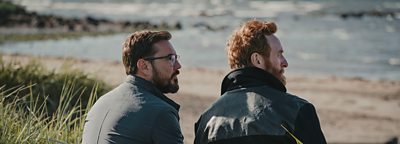This is not just a story about assisted dying, it’s a story about living. It’s about humanity, in all its flawed glory, and the importance of the connections we make. Yes, it’s emotional and raw but it’s also funny and life affirming.
Everyone has a Tully Dawson (Tony Curran) - the friend who defines your life. In the summer of 1986, in a small Scottish town, Jimmy (Martin Compston) and Tully ignite a brilliant friendship based on music, films and the rebel spirit. With school over and the locked world of their fathers before them, they rush towards the climax of their youth - a magical weekend in Manchester, the epicentre of everything that inspires them in working-class Britain. There, against the greatest soundtrack ever recorded, a vow is made: to go at life differently. Thirty years on, half a life away, the phone rings. Tully has the worst kind of news, and a request that will test their friendship, love, and loyalty to the limit…
Adapted by Andrea Gibb (Elizabeth Is Missing) and directed by Peter Mackie Burns (Rialto) from Andrew O’Hagan’s acclaimed novel, Mayflies is a memorial to youth’s euphoria and to everyday tragedy. A tender goodbye to an old union, it discovers the joy and the costs of love.
Mayflies (2x60’) is a Synchronicity Films (The Cry) production for the BBC, co-commissioned with BBC Scotland, in association with All3Media International with support from Screen Scotland. Filming took place around Glasgow and Ayrshire.
Mayflies will air on BBC Scotland, BBC One and BBC iPlayer. All3Media International are handling international sales.
HM2
Cast
Martin Compston – Jimmy
Tony Curran – Tully
Ashley Jensen – Anna
Tracy Ifeachor – Iona
Rian Gordon – Young Jimmy
Tom Glynn-Carney – Young Tully
Paul Gorman – Young Hogg
Mitchell Robertson – Young Tibbs
Elaine C. Smith – Barbara
Shauna Macdonald – Fiona
Cal MacAninch – Tibbs
Colin McCredie – Scott
Matt Littleson – Young Limbo
Crew
Claire Mundell – Executive Producer for Synchronicity Films
Brian Kaczynski – Producer
Andrea Gibb – Writer & Executive Producer
Andrew O’Hagan – Executive Producer
Peter Mackie Burns – Director
Gavin Smith – Executive Producer for BBC Scotland
Gaynor Holmes – Executive Producer for BBC Drama
Interviews
Interview with Andrew O’Hagan (Novelist & Executive Producer)
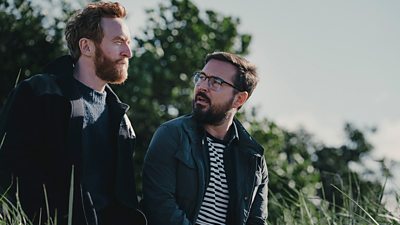
Could you give us an overview of Mayflies and what your inspiration was behind writing it?
Mayflies is the story of a group of guys who grow up together in Ayrshire, about their love of music and politics in 1986, and what happens to them thirty years later. The early part of the drama centres around a famous concert they attended in Manchester, but many years later, they are forced to ask what friendship is all about, and how reliable are your old pals?
Could you tell us about the key characters?
Tully is the heroic front-man of the young boys; Jimmy is his best friend, already a budding writer in 1986. Jimmy is shy and unsure of how to find his place in the world and Tully provides a shining, working-class example: everybody loves him, he’s true to himself, he’s really good at life, but as the story unfolds the boys and their wives – the powerful Anna and the sensitive Iona – are put to the test when terminal illness suddenly enters the picture.
Were you involved in the casting at all?
As an Executive Producer, I took a great interest in the production. Finding the right actors to play these boys was a crucial task from the beginning. We looked at a lot of very talented people but the ones we found seemed to burst with energy and understanding. Casting is a tough game and it keeps you up at night!
What aspects of the story do you think audiences will relate to?
Everybody has a friend, and, though romantic love gets all the big headlines – all the songs, all the big movies – male friendship is a kind of love that is often ignored. You can live your whole life in company with a friend, and I think audiences will really relate to the glories, the challenges and the responsibilities it brings. Mayflies set out to capture that. Also the unforgettable intensity and magic of youth; I was hoping people would be reminded of that, and see how it reverberates all through your life.
Did you manage to visit set at all? If so, how was that experience?
I was on the set a lot, mainly as a cheerleader and a mascot. I wanted to be available to the screenwriter, Andrea, to the director, Peter, and to the actors, who would often ask me about a particular detail or a local Scottish habit from the past. Authenticity was important to us all and I tried to pitch in and assist where I could. It was also just fun to be with these brilliant people as they worked to tell this very warm-hearted story.
How did you find the production process?
I loved it. I mean, intense and difficult, very long hours, working at breakneck speed, but I loved the process of putting something into the world that wasn’t there before. It’s very different from the process of writing alone at a desk, and I became a bit addicted to the determination and gang-feeling we all had, all pitching in and stepping back. It felt very natural and I was deeply proud of the cast and crew in bringing Mayflies to life.
How would you describe Mayflies in one sentence?
A story of lifelong friendship and what it costs.
What do you hope TV audiences take away from the adaptation of Mayflies?
I think they’ll take away joy and sadness, humour and reflection, a sense of life’s big questions amid the best soundtrack ever to hit the BBC.
Interview with Andrea Gibb (Screenwriter & Executive Producer)
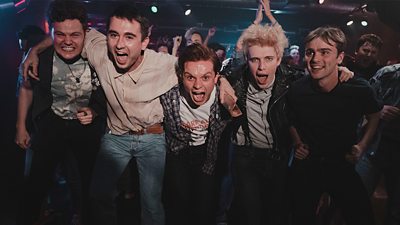
Were you a fan of Andrew’s novel Mayflies previously?
I read the book before it had been published and before it went out to the public and fell in love with it immediately. It’s been amazing, and perhaps a little daunting, to see how well it’s been received and how it’s been lauded as a profound and tender work. It’s both of those things but it’s also very funny and never sombre, even when it’s exploring the reality of our mortality. This is a book about life and death and everything in between. It’s a huge responsibility to adapt something so humane and I really hope I’ve done it justice.
How did you get involved with developing the novel into the TV adaptation?
Claire Mundell, Creative Director of Synchronicity Films (and one of my best friends) sent me Andrew’s book while it was still in manuscript form. We’d been looking for something to do together and she thought Mayflies was it. She was right. I read it immediately and fell in love completely. It’s exquisitely written and painfully true. It also resonated deeply with me because my partner, Simon, had died a couple of years earlier from cancer. I could understand all the complex, conflicted emotions all the characters were experiencing, but particularly the character of Anna, Tully’s wife. Luckily, for Claire and I, Andrew agreed to trust us with this most personal book and we are privileged to have been given the opportunity.
Where did you start in the process?
I worked very closely with Claire and her Head of Development, Deanne Cunningham, on how to structure the scripts for a television audience and we made the decision to tell it in two inter connected timelines, and not in two separate halves. The second half of the book is the dominant narrative and 1986 is presented as a series of vivid memories, triggered by Jimmy and Tully’s emotional state in the present day. Novels and screen stories are two very different forms and the challenge of any adaptation is taking the essence of the novel, keeping the truth of it, while making it work as a dramatic and visual experience.
Were there conversations between yourself and Andrew O’Hagan in the adaptation process?
Andrew has been the most generous and brilliant collaborator. He’s an Executive Producer and has been closely involved throughout the script process, through the shoot and into post production. He completely understands the need to make some changes to suit the televisual form and gave us his blessing. His insights into his story, characters and their relationships has been invaluable and I’ll be eternally grateful to him - not just for the gift of his book but for his creative genius.
What do you find most rewarding and most challenging about adapting a novel for the screen?
All adaptations bring their own challenges and their own joys. I love working from books. I’ve been lucky to adapt some really amazing literary work and it’s always gratifying when it moves from page to screen and is true to the author’s original intention. Adapting Emma Healey’s Elizabeth is Missing was one of the most rewarding experiences of my writing life, though it was not without its difficulties. The story was told from a single point of view by an unreliable narrator, who had dementia. That seems counter-intuitive to a screenwriter. How could I tell the story of a woman with no short term memory without shifting to other points of view? But it was only when I committed entirely to staying with Maud throughout that the adaptation started to work. All the clues are in the books themselves, you just have to know where to look.
What's the best piece of writing advice you've been given or that you can share?
I was once told ‘never believe them when they tell you your work is good and never believe them when they tell you it isn’t.’ In short, trust yourself, but you have to listen as well. It’s important to be open to ideas while remembering that no one has all the answers. It’s the people who ask the big questions that are always the most valuable in the screenwriting process. The beauty of working with producers as gifted as Claire is that she does.
As you are also an executive producer on this project, how did that role shape your experience?
I love being an Executive Producer and everything that comes with it. I used to be an actor so I enjoy being on set and watching the actors creating magic from the words. With Mayflies, I’ve been very involved in every stage of the process - from casting, through the shoot, and into the edit. Working closely with Claire and producer Brian Kaczynski, and seeing first-hand how production schedules and budgets impact on script, has been invaluable. I hope I can use that knowledge and understanding going into my next scripts.
What do you hope audiences take away from watching Mayflies?
This is a story that confronts the end of life and how it can be managed. It asks the difficult question - do we have the right to control our own death? There are many sides to this debate - all of them valid - and I hope Mayflies will help kick start a conversation. It’s an important one and one we should be having as a society. But this is not just a story about assisted dying, it’s a story about living. It’s about humanity, in all its flawed glory, and the importance of the connections we make. Yes, it’s emotional and raw but it’s also funny and life affirming. Ultimately, it's a story of love and friendship. And it’s unusual because it explores platonic love between a group of young working class men, who are steeped in politics and culture, and who dare to dream of a life beyond their own circumstances. It’s inspirational in that way. Finally, I’d like the audience to be moved and changed by it. I hope they laugh and fall in love with the characters. I hope they empathise with the situation and I hope it demonstrates that life is precious and short, and we should treasure it.
Interview with Martin Compston (Jimmy)
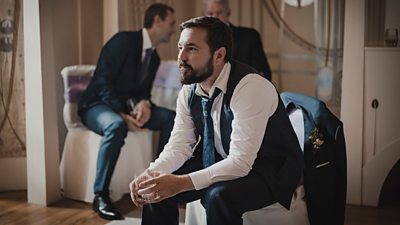
Could you give us a brief overview of Mayflies?
It’s a drama based around relationships and friendships. The main characters are two old friends who have been best pals for decades and one of them gets life changing news. He plans to act on that news and enlists the help of his best friend. It’s set across two timelines and is by far the most emotionally challenging job I’ve ever done.
Tell us about your character Jimmy?
Jimmy is from the west coast of Scotland; he moves to London and becomes a successful writer in the literary world. Jimmy’s a good guy who has done well for himself but hasn’t forgotten his roots; he’s nostalgic, romanticises his past, his friends and his family and has a big heart. He was great to play.
How did you become involved in the project?
I got cast... these things are never overly complicated. Bizarrely, when it came through to me from my agent, I was in a field in Budapest at an Arctic Monkeys gig. It was 1am and I thought I was tripping! Tony Curran, who plays Tully, has been one of my best pals for years so seeing his name already attached was exciting because I love working with pals. I mentioned the project to the journalist I was with, as I was doing a feature for the Big Issue, and his face lit up - Mayflies feels like a really well-loved book, especially by writers. I read the script and loved it.
Tell us about Jimmy and Tully’s friendship?
They’re incredibly close. What’s so amazing is that sometimes young people in film are portrayed as being involved in gangs and violence, but this group are obsessed with films, music, culture. They feel like an arty bunch, boys with broad minds, and I can relate to that as I grew up with films and music at the centre of my world. I couldn’t imagine anyone else playing Tully, I thought of Tony as soon as I read it. At one point, Jimmy calls Tully the life force and that is Tony. He’s the energizer bunny, great fun to be around, absolutely full of beans. He’s perfect casting.
Tell us about filming in Scotland?
It’s always a joy to be at home! I remember one particular scene where Tracy, who plays my wife, and I are on a beach in Ayrshire having a disagreement. The sun was breaking through the clouds, there were castle ruins in the background and we were looking out to sea. Scotland really is the most beautiful stage. In a setting like that, you get this feeling of “I need to do this scene and this setting justice.” On the other hand, we nearly got washed away when a downpour came through, but that’s the joy of shooting in Scotland.
Did you get to meet younger Jimmy (played by Rian Gordon)?
When I first read the script they didn’t tell me they’d have different actors playing the younger characters. I thought for a second I was playing the younger Jimmy as well…it was heart-breaking when I realised that wasn’t the case. Ha! Rian is a great lad and the whole young team were brilliant. It was really reassuring because in the section where I play Jimmy, there’s a lot of emotional stuff. It’s very intense and you can feel like you’re in a dark tunnel. But the young team hanging out and hitting it off brought another side to it with moments of joy and light. Rian and Tom, who plays young Tully, were on top form. It can be scary to hand something over to another actor but their commitment was phenomenal. They’d send videos of them all on nights out, being young lads, which was brilliant to see.
What do you hope audiences take away from the series?
First and foremost it’s entertainment; that’s what TV is, and you hope people enjoy it. But there’s also a big conversation to be had around assisted dying. I’m a huge supporter of hospices - I’m a patron of Ardgowan Hospice in Greenock - and I know people can be treated with dignity and respect when it comes to end of life care. There is this element you can’t escape where people feel they have to go to a different country to end their life in their own way. Mayflies doesn’t have the answer but within the show we look at both sides, and there are strong opinions from both, and we balance it. I hope it sparks a conversation.
Describe Mayflies in three words?
I would say nostalgic, emotional and hopeful.
Interview with Tony Curran (Tully)
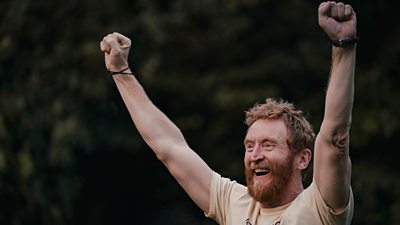
Tell us about your character Tully?
Tully is 50 years old and he’s an English teacher who lives in a small town in Scotland with his wife Anna.
Where do we first meet Tully in the story?
We first meet Tully in 1986 in a Working Men’s Club where he’s with all his pals and singing in his band ‘The Sherbet Fountains’.
What was your first impressions when you read the script?
When I first read Andrea’s scripts I was very excited to be part of this story. The characters felt very relatable to me as it begins in the 80s, a time when I was a teenager growing up in Scotland. I feel Andrea has captured Andrew O’Hagan’s novel beautifully, the poetic raucous rebel nature of these young men growing up and then as times passes the powerful and moving outcome of their great friendship.
Did you get to meet younger Tully (played by Tom Glynn-Carney)?
I did get to meet Tom, it was lovely having him playing the younger Tully. We obviously didn’t have much interaction but when we did it was a real pleasure and great to watch him work.
What was it like working opposite Martin, had you worked together before?
I was so happy when I found out Martin was going to be playing Jimmy. We both worked together many years ago on a film called ‘Red Road’ and we both had a good experience on that. As Tully and Jimmy mainly drive our story and they are extremely close friends, they’ve known each other since they were kids, almost like brothers. It was important that we had to feel that kinship between them, a history, kind of bromance if you will. It’s always a joy working with Martin, he’s always so present and giving as an actor and of course he’s also a mad Celtic fan like myself.
Tell us about filming in Scotland?
As I live in the States I haven’t recently been shooting that often in Scotland. But every time I’ve had the opportunity to come home it’s always a joy for me to do so, especially being close to my family while I’m shooting is great. I do miss the sense of humour and the people and the landscapes, some of the locations we shot at were quite beautiful so it’s always lovely to come home.
How would you summarise Mayflies?
The story of Mayflies to me is about deep humanity, the magic of youth, identifying with each other, friendship, kinship, the love between people, between friends and how that can be tested as time passes but ultimately never dies. They’ll always be there for each other.
Interview with Ashley Jensen (Anna)
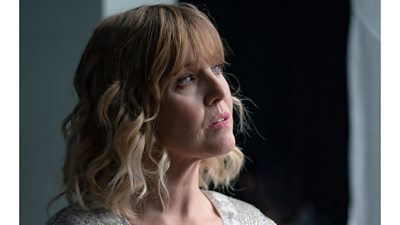
Tell us about your character Anna?
Anna is Tully’s wife. She is a lawyer and a strong woman who has met the love of her life in Tully. He is all she needs. They are a great partnership, their relationship is solid and passionate. Tully has met his match in Anna.
Where do we meet Anna at the beginning of the show?
At the beginning of Anna’s journey in the script, they have not long found out that he has advanced cancer. She will do anything and everything to keep him with her for as long as she can. Her strong moral code is challenged when she discovers what Tully’s intentions are but also that his best friend Jimmy has formed an alliance with him and they have been plotting together without her knowledge. She is faced with a life changing choice. Does she go along with it or oppose it? The story follows a lifelong friendship that is put to the test and how we can navigate love and marriage and also love and friendship together.
What was it like working opposite Tony Curran?
I have known Tony from our theatre days in Glasgow in the 90s and time in LA (where I also met Martin). Though we have never worked together I have always admired him as an actor. He was a total joy to work with as was Martin Compston. It is such a sensitive subject and being very aware that most people unfortunately have had some kind of personal knowledge or experience of cancer, we wanted to be as honest as we could be which required a tremendous amount of focus. Both are very receptive and open as actors with a lot of humility and humour which made the shoot a lot easier.
How did you find filming in Scotland?
I loved being back in Glasgow filming. It is such a damn cool city with such warmth and humour; it was just glorious to be back in the homeland. It’s been a while! I felt I was almost able to see it with new eyes. Not only is it architecturally stunning; its vibrant, creative and unpretentious, plus the weather was very kind to us. Except for one day which was at the beach. Martin and Tony battled the elements with the fantastic crew and every one of them wore a smile!
Had you read the book before getting the role?
I hadn’t read the book but as soon as I knew I was doing the job I read it. Safe to say it was so beautifully written, brave, poetic, honest and heart-breaking that I read it in a couple of days - albeit through tears for the last 20 pages. It has wit and humour and is strangely life affirming despite the subject; an ode to youth and a reminder to live every day as best we can.
What were your first impressions when you read the script?
Andrea Gibb’s beautiful script is very true to the book and quite frankly how she managed to get everything into a two episode piece is phenomenal. Peter Mackie Burns’ direction was detailed, sensitive and nuanced. It was a great team who all worked together towards the same goal; to tell Andrew’s story and bring it to life.
Interview with Tracy Ifeachor (Iona)
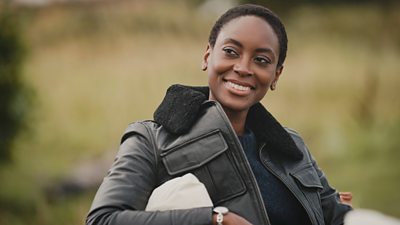
Tell us about your character Iona?
Iona is an actress. She is loving, kind and a positive uplifting presence and is married to Jimmy, played by the wonderful Martin Compston. One of the things I love about Iona is that she never judges or condemns anyone, even if she doesn’t agree with their choices. She is by nature a hopeful and honest person, expecting a reciprocal relationship with everyone around her.
Where do we meet Iona at the beginning of the show?
When we first meet Iona, she is on tour with a play. She’s happy, uplifted and couldn’t be closer to her husband. They are each other’s best friend. Jimmy (her husband) and Iona have a relationship where they don’t have to lie to each other. For better or for worse, they are always honest. When decade long friendships call on old alliances, this threatens to quickly change. Iona isn’t someone to come between two friends, so their marriage is tested when the couple are placed in a seemingly impossible position.
What was it like working opposite Martin Compston?
Hated it, ha! No, it was lovely. I couldn’t have asked for a more playful, considerate and seasoned on-screen partner. It really felt like we were all a team heading for the same goal with zero ego, learning all the way. He was so shy on our first day. He was very respectful. We met and immediately had to do the scene on the beach when he’s declaring his undying love to Iona. He’s a true artist and I had a blast. It felt like all four of us ‘lived’ this project. It was intense but I believe it will be hopeful because of the respectful way in which this amazing production team handled this complex subject, from start to finish.
How did you find filming in Scotland?
Beautiful. I remember working on the Isle of Mull which has incredibly views and stunning wild life so I was excited to go back to Scotland. I have some family there and I love the honesty of the Scottish people and its culture. Arguably Scotland has some of the most beautiful coastlines, I believe, in the world. I love it there. I love the culture and was really accepted and welcomed by the Scottish people from the moment I arrived. I was very comfortable there.
Had you read the book before getting the role?
Yes, I listened to the audio book before moving ahead and remember thinking how lived in it felt. When I met Andrew, the writer, he told me that he had voiced the novel for audio book. I love it when authors do that. You really get to hear their thoughts, with every utterance. This was made even more powerful when I learnt that it was inspired by a true story, on his own experiences.
What were your first impressions when you read the script?
Andrea did an amazing job. I feel she really captured the tone, and essence of the source material. The script felt like it was an extension of the novel. Both writers have an amazingly powerful connection to this topic, but I’ll let them tell their own story. For now I’ll just say, I was blown away by the way it was depicted and the essence Andrea and Claire Mundell (executive producer) captured and have delivered with the help of an amazing director.
How would you summarise Mayflies?
It’s a complex piece about what happens when one terminally ill person makes an unthinkable decision and how that decision effects all the other relationships around it. Mayflies will challenge audience’s preconceptions in a powerfully poignant, sometimes humorous but uplifting way. What would you do if you were faced in a seemingly impossible situation with only several ‘bad’ options? Well Mayflies seeks to respond to that question in a respectful, truthful, and hopeful way.
Interview with Claire Mundell (Executive Producer, Synchronicity Films)

Could you give us an overview of Mayflies as a story?
Mayflies is both a coming-of-age story and a meditation on life-long male friendship, assisted dying and what it means to take control and live the lives we truly want to. It is nostalgic, poignant and moving and honestly depicts the bonds and boundaries of a shared life and values.
Had you read the novel of Mayflies previously?
I read the novel when it was sent to me at manuscript stage and instantly fell in love with the story, the characters and the writing which is so moving and poetic. A good friend of mine died from cancer a few years ago and many of my family have suffered from it too, so the story spoke to me on a very personal level. They did not have the option to determine the end of their own lives, and I found myself exploring Jimmy's dilemma from a very personal position. I am also a huge admirer of Andrew O'Hagan's writing and have followed his career with interest since his very first book. Though I love so much of his work, I think Mayflies is his most moving book to date. From the very first page, Andrew’s beautiful novel had me totally enthralled.
How did Synchronicity Films come to the project and how did you get involved as Executive Producer?
Having read the manuscript, I was determined to try to option the novel. At Synchronicity we like to explore pertinent, contemporary issues through the lens of elevated drama. We also like to celebrate Scottish writers and writing and so this was the best combination of everything we love. I also knew that my good friend and collaborator, the wonderful screenwriter Andrea Gibb would be perfect to adapt this novel. That might seem counter intuitive (or even controversial!) given she's a woman and this is a story about male friendship, but Andrea has direct experience of nursing her late partner through a very similar situation, and I knew the combination of her personal experience and her incredible, emotionally rooted writing would nail the empathy and the sentiment needed for this piece.
In terms of the casting, what were the most important elements to you?
It was vital to find two lead male actors who had real friendship 'chemistry'. That was really important to us from the get-go. We knew we wanted Scottish cast for these roles, actors who would understand the backdrop of the story in the past - young boys who grew up in 1980s working class Scotland and the political and social connotations of that time. Tony was cast first and that led us to look at who would work opposite Tony, which very quickly led to Martin! They have been friends in real life for many years and they have an emotional connection and sense of humour which is real both off camera and on camera! You can feel that friendship in their performance on screen as Tully and Jimmy, and that elevates the emotion of the drama to another level and provides a level of truth and authenticity that I think the audience will believe and buy into. It makes for really raw, emotionally truthful performances from them both. As the story spans two eras, we also had to ensure that the younger actors were well matched with their older onscreen counterparts.
What aspects of the story do you think audiences will relate to?
I think everyone can relate to what it means to confront your own mortality or the mortality of someone you love. That creates a universal access point to the story for the audience. Most people understand the appeal and the comfort of friendship, so that's another access point. Finally, we all know what it means to be younger and imagine how your life might pan out, to make plans for the future and to then have to confront a present day life that doesn't match what you envisaged. So, I think this show is incredibly relatable - no matter the age of the audience. Plus who doesn't love a bit of 80s nostalgia, music, culture and fashion!
How have you found the production process and seeing the novel come to life?
The production process has been joyful, fast, pressured, exhilarating and challenging! In many ways, for a production company, this was wonderful - a quick commissioning decision and a fast turnaround! It rarely happens that way. However, given the production 'boom' in Scotland we found ourselves shooting alongside at least ten other shows, all of which were competing for crews, talent, cast and locations. I've never seen it so busy which was great to witness, but also made for a range of production issues which we had to navigate at speed. Our producer Brian Kaczynski, first assistant director Stephen Rigney and line producer, Shona Mackenzie did a brilliant job of making Mayflies happen from a production POV. These vital crew members rarely get the credit they deserve for their logistically minded deft story-telling skills!
How important was it to have the show filmed in Scotland?
It was critical to film Mayflies in Scotland. The story in the novel is set here, it is written by a Scottish novelist and the themes, whilst universal, also have specific geographical Scottish social and political nuance. It was vital to make authenticity a central part of the show so there was no other option to film it anywhere but Scotland and with mostly Scottish cast and crew.
What do you hope TV audiences will take away from the adaptation of Mayflies?
I hope audiences will be moved; that they will be exhilarated by the lessons on how to live and how to be in the moment that Tully shows us; that they will cherish their own friendships perhaps a little more; that they will understand and empathise with the complexities which people who are facing a terminal diagnosis have to deal with; and that they will ponder their own mortality and what they would do in such a situation. I want people to laugh and cry all at the same time with this piece, and for them to come away from the drama cherishing life and what it means to be alive.
